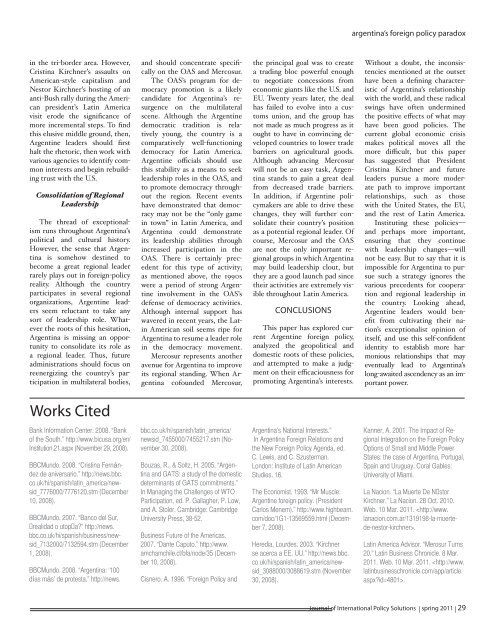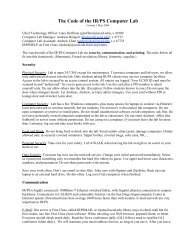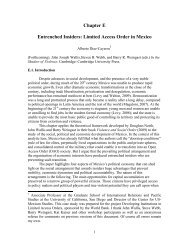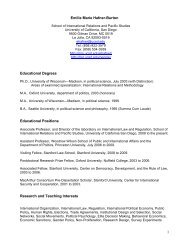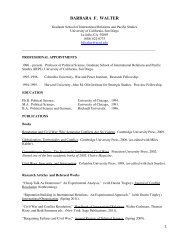to download the full journal. (1.2MB PDF) - School of International ...
to download the full journal. (1.2MB PDF) - School of International ...
to download the full journal. (1.2MB PDF) - School of International ...
You also want an ePaper? Increase the reach of your titles
YUMPU automatically turns print PDFs into web optimized ePapers that Google loves.
argentina’s foreign policy paradox<br />
in <strong>the</strong> tri-border area. However,<br />
Cristina Kirchner’s assaults on<br />
American-style capitalism and<br />
Nes<strong>to</strong>r Kirchner’s hosting <strong>of</strong> an<br />
anti-Bush rally during <strong>the</strong> American<br />
president’s Latin America<br />
visit erode <strong>the</strong> significance <strong>of</strong><br />
more incremental steps. To find<br />
this elusive middle ground, <strong>the</strong>n,<br />
Argentine leaders should first<br />
halt <strong>the</strong> rhe<strong>to</strong>ric, <strong>the</strong>n work with<br />
various agencies <strong>to</strong> identify common<br />
interests and begin rebuilding<br />
trust with <strong>the</strong> U.S.<br />
Consolidation <strong>of</strong> Regional<br />
Leadership<br />
The thread <strong>of</strong> exceptionalism<br />
runs throughout Argentina’s<br />
political and cultural his<strong>to</strong>ry.<br />
However, <strong>the</strong> sense that Argentina<br />
is somehow destined <strong>to</strong><br />
become a great regional leader<br />
rarely plays out in foreign-policy<br />
reality. Although <strong>the</strong> country<br />
participates in several regional<br />
organizations, Argentine leaders<br />
seem reluctant <strong>to</strong> take any<br />
sort <strong>of</strong> leadership role. Whatever<br />
<strong>the</strong> roots <strong>of</strong> this hesitation,<br />
Argentina is missing an opportunity<br />
<strong>to</strong> consolidate its role as<br />
a regional leader. Thus, future<br />
administrations should focus on<br />
reenergizing <strong>the</strong> country’s participation<br />
in multilateral bodies,<br />
and should concentrate specifically<br />
on <strong>the</strong> OAS and Mercosur.<br />
The OAS’s program for democracy<br />
promotion is a likely<br />
candidate for Argentina’s resurgence<br />
on <strong>the</strong> multilateral<br />
scene. Although <strong>the</strong> Argentine<br />
democratic tradition is relatively<br />
young, <strong>the</strong> country is a<br />
comparatively well-functioning<br />
democracy for Latin America.<br />
Argentine <strong>of</strong>ficials should use<br />
this stability as a means <strong>to</strong> seek<br />
leadership roles in <strong>the</strong> OAS, and<br />
<strong>to</strong> promote democracy throughout<br />
<strong>the</strong> region. Recent events<br />
have demonstrated that democracy<br />
may not be <strong>the</strong> “only game<br />
in <strong>to</strong>wn” in Latin America, and<br />
Argentina could demonstrate<br />
its leadership abilities through<br />
increased participation in <strong>the</strong><br />
OAS. There is certainly precedent<br />
for this type <strong>of</strong> activity;<br />
as mentioned above, <strong>the</strong> 1990s<br />
were a period <strong>of</strong> strong Argentine<br />
involvement in <strong>the</strong> OAS’s<br />
defense <strong>of</strong> democracy activities.<br />
Although internal support has<br />
wavered in recent years, <strong>the</strong> Latin<br />
American soil seems ripe for<br />
Argentina <strong>to</strong> resume a leader role<br />
in <strong>the</strong> democracy movement.<br />
Mercosur represents ano<strong>the</strong>r<br />
avenue for Argentina <strong>to</strong> improve<br />
its regional standing. When Argentina<br />
c<strong>of</strong>ounded Mercosur,<br />
<strong>the</strong> principal goal was <strong>to</strong> create<br />
a trading bloc powerful enough<br />
<strong>to</strong> negotiate concessions from<br />
economic giants like <strong>the</strong> U.S. and<br />
EU. Twenty years later, <strong>the</strong> deal<br />
has failed <strong>to</strong> evolve in<strong>to</strong> a cus<strong>to</strong>ms<br />
union, and <strong>the</strong> group has<br />
not made as much progress as it<br />
ought <strong>to</strong> have in convincing developed<br />
countries <strong>to</strong> lower trade<br />
barriers on agricultural goods.<br />
Although advancing Mercosur<br />
will not be an easy task, Argentina<br />
stands <strong>to</strong> gain a great deal<br />
from decreased trade barriers.<br />
In addition, if Argentine policymakers<br />
are able <strong>to</strong> drive <strong>the</strong>se<br />
changes, <strong>the</strong>y will fur<strong>the</strong>r consolidate<br />
<strong>the</strong>ir country’s position<br />
as a potential regional leader. Of<br />
course, Mercosur and <strong>the</strong> OAS<br />
are not <strong>the</strong> only important regional<br />
groups in which Argentina<br />
may build leadership clout, but<br />
<strong>the</strong>y are a good launch pad since<br />
<strong>the</strong>ir activities are extremely visible<br />
throughout Latin America.<br />
CONCLUSIONS<br />
This paper has explored current<br />
Argentine foreign policy,<br />
analyzed <strong>the</strong> geopolitical and<br />
domestic roots <strong>of</strong> <strong>the</strong>se policies,<br />
and attempted <strong>to</strong> make a judgment<br />
on <strong>the</strong>ir efficaciousness for<br />
promoting Argentina’s interests.<br />
Without a doubt, <strong>the</strong> inconsistencies<br />
mentioned at <strong>the</strong> outset<br />
have been a defining characteristic<br />
<strong>of</strong> Argentina’s relationship<br />
with <strong>the</strong> world, and <strong>the</strong>se radical<br />
swings have <strong>of</strong>ten undermined<br />
<strong>the</strong> positive effects <strong>of</strong> what may<br />
have been good policies. The<br />
current global economic crisis<br />
makes political moves all <strong>the</strong><br />
more difficult, but this paper<br />
has suggested that President<br />
Cristina Kirchner and future<br />
leaders pursue a more moderate<br />
path <strong>to</strong> improve important<br />
relationships, such as those<br />
with <strong>the</strong> United States, <strong>the</strong> EU,<br />
and <strong>the</strong> rest <strong>of</strong> Latin America.<br />
Instituting <strong>the</strong>se policies—<br />
and perhaps more important,<br />
ensuring that <strong>the</strong>y continue<br />
with leadership changes—will<br />
not be easy. But <strong>to</strong> say that it is<br />
impossible for Argentina <strong>to</strong> pursue<br />
such a strategy ignores <strong>the</strong><br />
various precedents for cooperation<br />
and regional leadership in<br />
<strong>the</strong> country. Looking ahead,<br />
Argentine leaders would benefit<br />
from cultivating <strong>the</strong>ir nation’s<br />
exceptionalist opinion <strong>of</strong><br />
itself, and use this self-confident<br />
identity <strong>to</strong> establish more harmonious<br />
relationships that may<br />
eventually lead <strong>to</strong> Argentina’s<br />
long-awaited ascendency as an important<br />
power.<br />
Works Cited<br />
Bank Information Center. 2008. “Bank<br />
<strong>of</strong> <strong>the</strong> South.” http://www.bicusa.org/en/<br />
Institution.21.aspx (November 29, 2008).<br />
BBCMundo. 2008. “Cristina Fernández<br />
de aniversario.” http://news.bbc.<br />
co.uk/hi/spanish/latin_america/newsid_7776000/7776120.stm<br />
(December<br />
10, 2008).<br />
BBCMundo. 2007. “Banco del Sur,<br />
¿realidad o u<strong>to</strong>pía?” http://news.<br />
bbc.co.uk/hi/spanish/business/newsid_7132000/7132594.stm<br />
(December<br />
1, 2008).<br />
BBCMundo. 2008. “Argentina: ‘100<br />
días más’ de protesta.” http://news.<br />
bbc.co.uk/hi/spanish/latin_america/<br />
newsid_7455000/7455217.stm (November<br />
30, 2008).<br />
Bouzas, R., & Soltz, H. 2005. “Argentina<br />
and GATS: a study <strong>of</strong> <strong>the</strong> domestic<br />
determinants <strong>of</strong> GATS commitments.”<br />
In Managing <strong>the</strong> Challenges <strong>of</strong> WTO<br />
Participation, ed. P. Gallagher, P. Low,<br />
and A. S<strong>to</strong>ler. Cambridge: Cambridge<br />
University Press, 38-52.<br />
Business Future <strong>of</strong> <strong>the</strong> Americas.<br />
2007. “Dante Capu<strong>to</strong>.” http://www.<br />
amchamchile.cl/bfa/node/35 (December<br />
10, 2008).<br />
Cisnero, A. 1996. “Foreign Policy and<br />
Argentina’s National Interests.”<br />
In Argentina Foreign Relations and<br />
<strong>the</strong> New Foreign Policy Agenda, ed.<br />
C. Lewis, and C. Szusterman.<br />
London: Institute <strong>of</strong> Latin American<br />
Studies, 16.<br />
The Economist. 1993. “Mr Muscle:<br />
Argentine foreign policy. (President<br />
Carlos Menem).” http://www.highbeam.<br />
com/doc/1G1-13569559.html (December<br />
7, 2008).<br />
Heredia, Lourdes. 2003. “Kirchner<br />
se acerca a EE. UU.” http://news.bbc.<br />
co.uk/hi/spanish/latin_america/newsid_3088000/3088619.stm<br />
(November<br />
30, 2008).<br />
Kanner, A. 2001. The Impact <strong>of</strong> Regional<br />
Integration on <strong>the</strong> Foreign Policy<br />
Options <strong>of</strong> Small and Middle Power<br />
States: <strong>the</strong> case <strong>of</strong> Argentina, Portugal,<br />
Spain and Uruguay. Coral Gables:<br />
University <strong>of</strong> Miami.<br />
La Nacion. “La Muerte De Nés<strong>to</strong>r<br />
Kirchner.” La Nacion. 28 Oct. 2010.<br />
Web. 10 Mar. 2011. .<br />
Latin America Advisor. “Merosur Turns<br />
20.” Latin Business Chronicle. 8 Mar.<br />
2011. Web. 10 Mar. 2011. .<br />
Journal <strong>of</strong> <strong>International</strong> Policy Solutions | spring 2011 | 29


